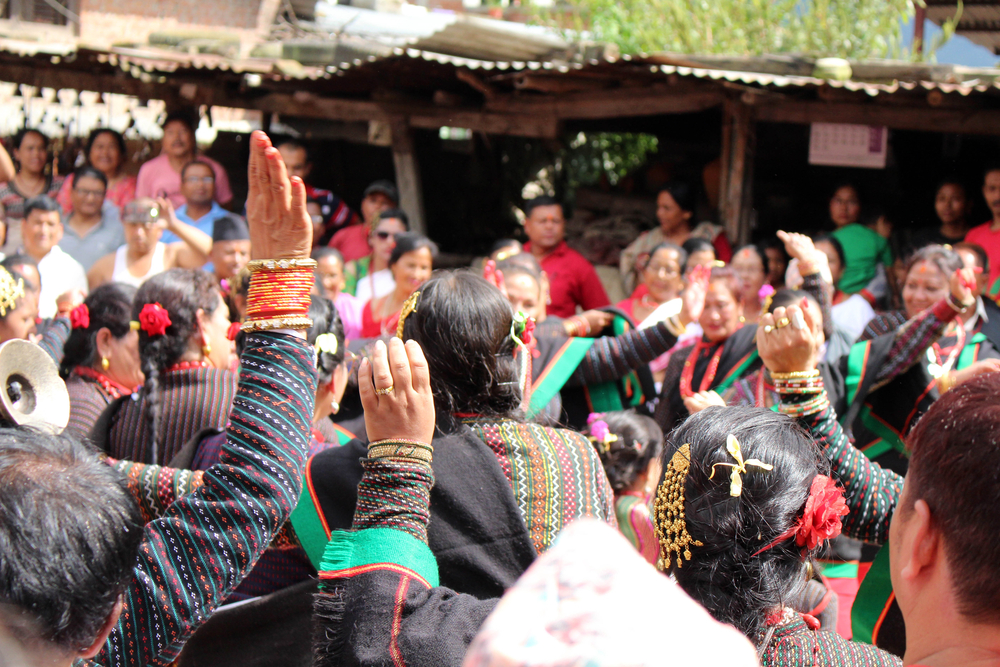A new article challenges the conventional deficit-based approach that often dominates the narrative in the Movement for Global Mental Health. For example, what is left out or forgotten when statistics like there is one psychiatrist per 1.7 million people in Ghana are presented? Whose knowledge, expertise, and services count as a measure of value, and whose can be sidelined and rendered invisible?
Instead of solely focusing on the inadequacies in mental health care systems in low-income countries, Mathias and colleagues emphasize the vital role of local expertise and informal care practices that are frequently overlooked.
Their article, published in PLOS Global Public Health, argues that the “deficit framing” prevalent in global mental health discussions can perpetuate harmful hierarchies and assumptions while sidelining the valuable contributions of community-based support systems.
When interventions are streamlined and scaled up in communities without engaging fully with local expertise and the specific sociohistorical contexts within which people with mental health conditions live and find support, they lose situational relevance, the ability to respond to changing needs within communities, and risk undermining local systems of care.
Through detailed case studies in Ghana, India, Occupied Palestine, and South Africa, the authors illustrate how these local practices and sociohistorical contexts shape effective mental health interventions, urging a shift away from one-size-fits-all solutions.
They assert that “through centering the survival tactics and strengths of people with lived experience of mental illness, families and others providing care, and wider communities, we can develop mental health care that is more relevant, acceptable, sustainable, and equitable.”
Contexts of care
Mathias and colleagues begin by drawing attention to the global forces and upstream structural determinants that are seldom detailed but critical in shaping health outcomes and local systems of care. The two prominent examples identified were colonialism and neoliberal capitalism.
Colonialism
The researchers trace the history of British colonial psychiatry, which varied between the four study countries but typically promoted a custodial model. Resources were largely used to build institutions for confinement with “lunacy laws.”
In South Africa, colonial and apartheid legislation created gross inequities between white and non-white populations, hindering access to care and other socioeconomic opportunities. While psychiatric services existed throughout urban asylums, they were heavily skewed towards white patients.
In Ghana, historical colonial legal frameworks subjected people with mental health difficulties to a system of alienation and confinement in prisons, then in the later developed Accra asylum, the sole psychiatric hospital that existed until independence. Thus, people with mental illness largely relied on families and communities. Centuries of the transatlantic slave trade and then colonial occupation created lasting economic inequity, which has hindered efforts to develop a more expansive public health system.
In Occupied Palestine (oPt), the context of settler colonialism persists today as Palestinians have continued to live under Israeli military occupation for over 50 years. The authors write:
“The current war on the Gaza Strip has, to this date, resulted in over 16,000 people killed, among them 6000 children [the number is now multiple times greater since the article’s publication just a few months ago]. Besides carpet bombing the Strip, Israel has placed it under a complete siege, cutting off supplies of water, food, fuel, and medicine.”
Beyond the direct effects of Israeli airstrikes, the complete siege placed on Gaza has induced a severe economic crisis responsible for the de-development of public and mental health services.
The availability of mental health services and funding for services throughout these countries was generally limited to a handful of large psychiatric hospitals, accessible to only a small fraction of the population. The focus on institutional services over community-based care continues to be seen in today’s national health budgets.
“In India, 94% of the 2022 direct mental health was assigned to just two tertiary health care institutions, leaving 6% for implementing district mental health programs in the rest of the country.”
“In Occupied Palestine, just 2.5% of the underfunded healthcare budget is dedicated to mental health, of which 73% is directed to the single psychiatric hospital.”
“In Ghana, the country’s three dedicated psychiatric hospitals absorb most of the mental health budget, and there is no ring-fenced budget for community mental health care.”
Neoliberal capitalism
The researchers detail the effects of changing macroeconomics on the health and opportunities of people living in the four study countries. They assert that neoliberal economics, characterized by trade liberalization, competitive markets, and privatization, has acted as a distal determinant to increase mental distress and reduce the affordability of mental health care in communities.
Although neoliberal reforms have contributed to economic growth in low-income countries, unemployment and inequities increased as much of the young labor force emigrated from countries like Ghana, and the privatization of psychiatric care has led to catastrophic expenditure for families.
“Unemployment, inequality, and associated health determinants such as homelessness and food insecurity have consistently been associated with increased mental health problems like depression and anxiety.”
Community Assets for Mental Health
As these global sociopolitical forces shape and influence communities, people resist and form support systems that build community resilience and contextualize responses to local mental health challenges. The informal support systems developed in communities provide care that is uniquely accessible and fluid in responding to changing needs within the community.
The researchers map these community assets onto four primary social groupings that include 1) the family and home, 2) community and social support, 3) faith-based care and traditional healers, and 4) non-profit organizations.
Family and home
Family homes were critical mental health assets in all four study countries, providing various forms of practical, social, financial, and emotional support.
The findings detail how family homes serve as a network of supportive care and a safe space to engage in the daily life and activities of the household. An NGO worker in Palestine describes how the family home is the primary communal space where people with mental health conditions can participate in social life while receiving protection and care.
“Families in Palestine are more protective and can deal with somebody with schizophrenia or psychotic symptoms. Families become close and try to help. Maybe the diagnosis is still sometimes secret inside the family–like schizophrenia or psychosis. But they don’t hide him from people.”
Despite the crucial role families play in caring for people with mental illness, there is a lack of government assistance for family caregivers in India and oPt, leading to greater physical, psychological, and financial strain for families.
Community and Social Support
Beyond the family home, wider community relationships and social networks play a key role in mental health in all four counties. Researchers show how families within caste groups in India can provide high levels of support to each other, as one community member accounts, “our neighbors did all the harvesting and caring for the fields while I took my time going with my wife on a pilgrimage to seek mental health care.”
The shared experience of agricultural work also serves as a force for bonding and reduced stress for women in rural India and South Africa. Their research also revealed organic forms of mutual support between people with lived experience in Ghana and South Africa, including peer home visits, caregivers gathering in community spaces like prayer camps, and mothers coming together to cook and share words of encouragement.
Faith-based care and traditional healers
In many communities, traditional healers are more accessible to the population than biomedical providers. In Ghana, their affordability, availability, and ability to address spiritual concerns and provide valued psychological support make them an appealing option. Ghana is unique among the countries that have shifted their model of mental health care from an institutional one to a pluralistic community-based approach, where traditional healers are integrated into the broader formal health system. Similar efforts are ongoing in South Africa, which was recently spotlighted in Aljazeera’s “The Take.”
The researchers addressed the ways in which faith healers and religious organizations in these four countries can, at times, work to buttress culturally mediated forms of exclusion and reinforce stigma through frameworks that attribute mental illness to moral failings. Yet, they found that many healers are pragmatic in their approach, working in concert with allopathic providers.
Nonprofit and civil society organizations
Mental health nongovernmental organizations (NGOs) exist and have become increasingly prominent in all four countries. While they carry a substantial service burden, providing medical care and labor and strengthening social networks, their services are often concentrated in urban areas and inequitably distributed. NGOs have also become increasingly integrated into formal health systems, which allows them more resources to expand their services.
However, the researchers describe how this can potentially tether organizations to the priorities of their funders and compromise their attunement to needs on the ground. Smaller charitable groups, faith communities, and universities are often community-funded and respond to locally identified needs in the absence of other accessible services.
Considering Community Contexts and Assets
The researchers’ findings underscore the importance of strengthening and building on local assets to address the specific mental health needs within communities. They identified that the co-production of policies and formal mental health programs with local communities was not well represented in all four study countries.
“Co-production involves those with lived experience of mental distress in designing, implementing, delivering, and evaluating relevant care, resources, and services and ensuring that services are person-centered, cost-efficient, innovative, and equitable.”
The authors believe that genuine co-production would require a shift in global mental health financing so that resources and power are redistributed and that systems are run, led, and kept accountable by the communities they serve.
“This helps to retain the key aspects that make them effective, such as contextual relevance and embeddedness, flexibility, and pragmatism.”
They caution that strengthening assets is not a substitute for addressing the structural causes of health inequities. Dialogue between community and formal health systems should retain focus not only on individuals but also on the structural and political forces affecting communities.
The logic behind transitioning towards community-led care extends beyond economic and medical rationales of increasing access to biomedical treatment but to a more expansive logic of care that includes addressing social, political, and structural sources of violence and exclusion.
“Ultimately, community-led-care could lead not simply towards the delivery of community-based treatment, but a re-articulation of what counts as care in the first place.”
****
Mathias, K., Bunkley, N., Pillai, P., Ae-Ngibise, K. A., Kpobi, L., Taylor, D., … & Read, U. M. (2024). Inverting the deficit model in global mental health: An examination of strengths and assets of community mental health care in Ghana, India, Occupied Palestinian territories, and South Africa. PLOS Global Public Health, 4(3), e0002575. (Link)
















There is no such thing as ‘mental illness’ which is a totally undefined and pretty meaningless term. What we actually have are the large spectrum of social traumas, baring in mind that the social conditioning of the brain and therefore the neurology and physiology of the natural organism is part of the problem we call ‘mental illness’. If we look at examples of children first: getting bullied for being over-weight, or somehow different, that is a social trauma. Bullying parents is social trauma. Racism is a social trauma. Poverty and the judgement it brings is social trauma. Parents not loving you is social trauma. All forms of abuse are social trauma. Failing at school and feeling stupid and worthless is a social trauma. Having no friends at school is a social trauma. Having a parent who is an alcoholic or addict, or who goes to prison, is a social trauma. And these are all ubiquitous in our society.
Of course there are more grave traumas. Having to live in a car or motel room is an appalling social trauma. Ging hungry too, or seeing your single parent disintegrate into stress and dysfunction because of money worries that is ruining her life and health. Going to care or foster home is a terrible social trauma – a third of British care leavers who leave care between the ages of 16 and 18 end up sleeping on the streets within two years: I don’t know what the figures are in America, but MOST people in the care system in America are on psychiatric drugs, so i understand.
These traumas have extraordinarily complex impacts on every system within the human being, both biological, neurological, emotional, mental, and beyond, and the truth is that only perception can begin to discover through observation what these are, and through understanding they can be healed, which is the principle in every kind of talking therapy, meditative approach and spiritual forms of therapy – and these produce much better long term outcomes then those put on chronic psychiatric drugs. But if we actually understood that the terrain that the problem occurs – within our own consciousness – is the only terrain that needs to be observed and understood, then we would radicalize our approach and understanding to mental health and the whole field of psychiatry and mental health care would become redundant. Why?
Because it is so patently obvious that social traumas including the psychological traumas that arise as a consequence of our socially conditioned thinking and self-judging, and the delusions within that social conditioning, produce what we call ‘mental illness’, and if each of you can’t frankly admit that to yourself, then I don’t understand what is wrong with our brains. Obviously the only sane thing to do is admit this and to suspect that every single case of what we call ‘mental illness’ is highly likely to be explicable in terms of such traumas, and if this is so, just look at the utterly profound disease of psychiatry and all our discourses and practices around ‘mental health care’. It is a vast, momumental, enormous scandal, an enormous crime, an enormous social scandal, a vast human rights abuse because we’re ruining brains by the hundreds of millions, perhaps a billion, every single day.
And if every child felt safe, secure, loved and able to be themselves, do you really believe they would what we call ‘mental health problems’, or addiction problems, or violent behaviour? These are evidence of the physiological, psychological and spiritual injuries caused by brutal social experiences in a blind and destructive social historical system that depends on illusion and includes the socially conditioned mind and brain. And the only truly human treatment for any adult with mental would be the obvious response of love: to make them feel safe, supported, to be in an atmosphere of social affection, to able to be themselves and go through what they need to go through. And I know this is the truth, but the truth behind what we call ‘mental illness’ doesn’t just condemn psychiatry – it condemns the whole of society, indeed the whole of civilization. I can’t argue this over and over again, but what if I am right? What do Mad In America and critical psychiatrists do?
The article above to me is of no value whatsoever because it accepts the principle of clinical ‘care’, but care without affection or understanding is not care: what we call psychiatry and mental health care is all harm in disguise, because it is concealing the real problem – the social process and the rapidly evolving social and psychological conditions – and blaming it on the brains of our children. None of you are confronting this at all. You can’t go there. You can only suspect it might be true: you can’t say it is so. Why not? Because society is so far behind understanding the total social process they are caught up in, which includes the brain. So what do we do? What can we do? Absolutely nothing. We have to end this process that is destroying the Earth and humanity but we never will in time, obviously. Just see what is as it is. Don’t fool yourselves. So what do we do? What can we do but see the truth of it all, and then there is something new: then there is more energy: then there is more urgency, clarity, passion etc: then there is far more energy, gravity and seriousness, and it is this energy, urgency, and clarity that is our only hope. It requires freedom from all social attachments, and all form of social control including intellectual regulation or control of the organism. And the population at large can never and will never do this. So I’m afraid their brains are as good as chopped liver, and I really mean that. They are conditioned by and adjusted to a system that is destroying them and us all. They have no future. It is this serious if you ask me, and what we call ‘mental illness’ pales in comparison to the universal mental sickness of our socially conditioned mind and brain which makes us confused, striving, unhappy egoists who cannot stop themselves destroying the Earth out of their eternally unquenched greed. I say again, this is how things are. You may or may not see it. But if you don’t, suppose I am right – what do we actually do? There is nothing but hopes and ideas that can be used to answer that question. I wonder if anyone sees all this.
Report comment